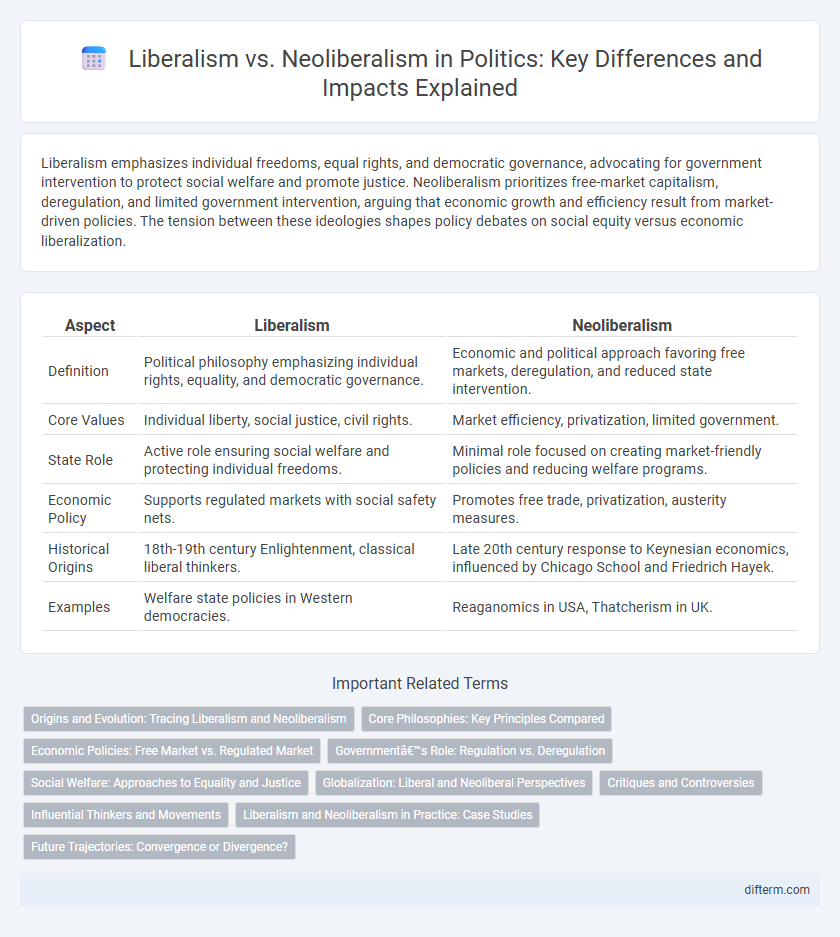Liberalism emphasizes individual freedoms, equal rights, and democratic governance, advocating for government intervention to protect social welfare and promote justice. Neoliberalism prioritizes free-market capitalism, deregulation, and limited government intervention, arguing that economic growth and efficiency result from market-driven policies. The tension between these ideologies shapes policy debates on social equity versus economic liberalization.
Table of Comparison
| Aspect | Liberalism | Neoliberalism |
|---|---|---|
| Definition | Political philosophy emphasizing individual rights, equality, and democratic governance. | Economic and political approach favoring free markets, deregulation, and reduced state intervention. |
| Core Values | Individual liberty, social justice, civil rights. | Market efficiency, privatization, limited government. |
| State Role | Active role ensuring social welfare and protecting individual freedoms. | Minimal role focused on creating market-friendly policies and reducing welfare programs. |
| Economic Policy | Supports regulated markets with social safety nets. | Promotes free trade, privatization, austerity measures. |
| Historical Origins | 18th-19th century Enlightenment, classical liberal thinkers. | Late 20th century response to Keynesian economics, influenced by Chicago School and Friedrich Hayek. |
| Examples | Welfare state policies in Western democracies. | Reaganomics in USA, Thatcherism in UK. |
Origins and Evolution: Tracing Liberalism and Neoliberalism
Liberalism originated in the 17th and 18th centuries as a political philosophy emphasizing individual liberty, limited government, and free markets, influenced by Enlightenment thinkers such as John Locke and Adam Smith. Neoliberalism emerged in the mid-20th century as a response to Keynesian economics, advocating for deregulation, privatization, and reduced state intervention to promote economic growth, with intellectual roots in the Chicago School and figures like Friedrich Hayek and Milton Friedman. The evolution reflects a shift from classical liberal principles focusing on political freedoms to neoliberalism's emphasis on economic efficiency and global market integration.
Core Philosophies: Key Principles Compared
Liberalism emphasizes individual rights, equality, and government intervention to promote social justice, focusing on protecting civil liberties and ensuring economic fairness. Neoliberalism prioritizes free-market principles, deregulation, and reduced government intervention, advocating for privatization and global economic integration to drive growth. Both philosophies value individual freedom, but neoliberalism shifts the emphasis towards market efficiency over state-led social welfare programs.
Economic Policies: Free Market vs. Regulated Market
Liberalism traditionally supports a regulated market aimed at correcting market failures and ensuring social welfare through government intervention. Neoliberalism advocates for a free market approach, emphasizing deregulation, privatization, and reduced government influence to promote economic efficiency and growth. Key economic policies in neoliberalism include lowering trade barriers and minimizing state control to enhance competitive markets and individual entrepreneurship.
Government’s Role: Regulation vs. Deregulation
Liberalism advocates for active government regulation to protect social welfare, ensure economic equality, and promote public goods, emphasizing the state's responsibility to intervene in markets. Neoliberalism prioritizes deregulation, reducing government intervention to enhance free market efficiency, innovation, and individual entrepreneurship. This fundamental divergence shapes policy debates on taxation, social programs, and market oversight.
Social Welfare: Approaches to Equality and Justice
Liberalism emphasizes social welfare through state intervention aimed at reducing inequality and promoting justice via comprehensive social safety nets and public services. Neoliberalism prioritizes market-driven solutions, advocating minimal government interference and encouraging private sector involvement in welfare provision to enhance efficiency. The two approaches diverge sharply on the role of the state, with liberalism supporting redistributive policies and neoliberalism favoring individual responsibility and economic freedom.
Globalization: Liberal and Neoliberal Perspectives
Liberalism traditionally emphasizes the protection of individual liberties, democratic governance, and open markets as drivers of equitable globalization, supporting state intervention to ensure social justice. Neoliberalism advocates for minimal state involvement, promoting free-market globalization through deregulation, privatization, and reduced trade barriers to maximize economic efficiency and growth. These ideological differences shape policy approaches to global trade agreements, international institutions, and social welfare impact within interconnected economies.
Critiques and Controversies
Liberalism faces critiques for emphasizing individual freedoms while neglecting systemic inequalities, often leading to insufficient social safety nets. Neoliberalism sparks controversy due to its advocacy for free-market policies that critics argue increase economic disparity and undermine public services. Both ideologies are challenged for promoting different forms of economic and social exclusion within political discourse.
Influential Thinkers and Movements
Liberalism, championed by thinkers like John Locke and John Stuart Mill, emphasizes individual rights, democracy, and free markets as foundations for social progress. Neoliberalism, shaped by economists such as Milton Friedman and Friedrich Hayek, advocates for minimal state intervention, deregulation, and privatization to promote economic efficiency and growth. Influential movements like the classical liberal Enlightenment fueled democratic revolutions, while neoliberalism gained momentum during the late 20th century, shaping policies in the Reagan and Thatcher administrations.
Liberalism and Neoliberalism in Practice: Case Studies
Liberalism advocates for individual freedoms, democratic governance, and social equality, emphasizing state intervention to address social injustices, as demonstrated in Scandinavian welfare models. Neoliberalism prioritizes market deregulation, privatization, and reduced government intervention, evident in the economic reforms of the 1980s United Kingdom and Chile under Pinochet. Case studies reveal that liberal policies often enhance social safety nets, while neoliberal approaches focus on economic growth through free-market mechanisms, impacting social equity differently.
Future Trajectories: Convergence or Divergence?
Liberalism and neoliberalism exhibit distinct trajectories that may either converge around market-friendly policies combined with social liberal values or diverge due to differing emphases on state intervention and global economic integration. The future of liberalism could involve a reassertion of welfare state principles, while neoliberalism prioritizes deregulation, privatization, and free trade as pathways to economic growth. Ongoing debates about inequality, climate change, and democratic governance will significantly shape whether these ideologies align or further split in political practice.
liberalism vs neoliberalism Infographic

 difterm.com
difterm.com